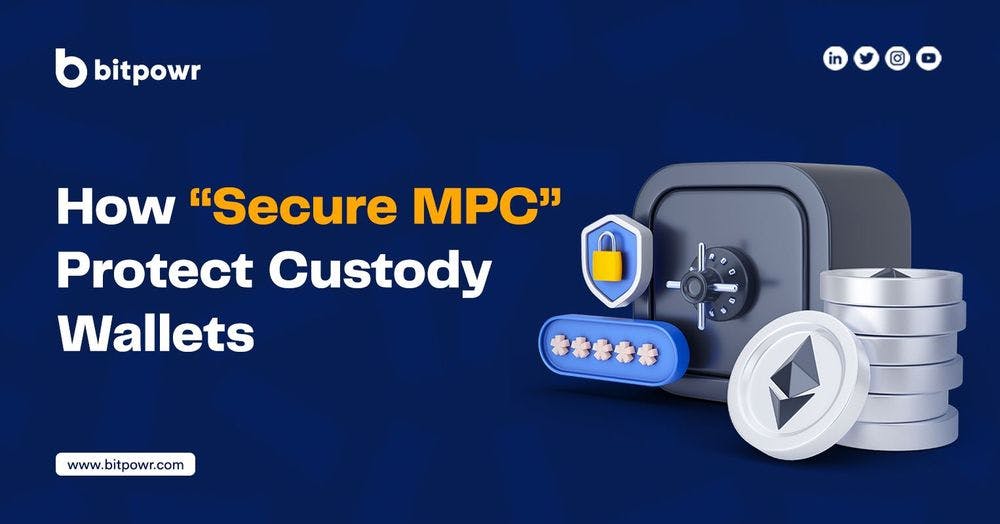How Secure MPC Protects Custody Wallets?
Secure MPC is a branch of cryptography that tries to create methods that enable parties to jointly calculate a function over their inputs while preserving the privacy of those inputs. In contrast to traditional cryptographic tasks, where the adversary is an outsider (an eavesdropper on the sender and receiver), and cryptography maintains the security and integrity of communication or storage, the cryptography in this paradigm protects participants’ privacy from one another.
The following characteristics help MPC achieve outstanding key security:
-
Throughout the entire lifecycle of a key, Secure MPC never generates a full private key on any machine, at any time. Keys are instead created by secure MPC in the form of distributed key shares, spending their entire existence within the bounds of the system on which they were created. This attribute sometimes referred to as “keyless” eliminates many vulnerabilities that have to do with key generation, key distribution, key storage, and key destruction.
-
Secure MPC runs entirely off-chain from the blockchain technology used by any digital asset. In contrast, alternative multiparty approval schemes such as MultiSig run on-chain.
The benefit of an off-chain scheme is that a change to a security policy, such as an approver or the number of approvers, is not recorded on the blockchain, decoupling key management from the underlying ledger technology. This eliminates the electronic breadcrumb trail that can provide would-be hackers with insight into your security policies or update practices. Reducing this electronic footprint increases privacy and reduces overall security risks.
-
While Secure MPC runs off-chain, the application can still provide a full record of exactly which parties participated in the approval of any transaction, as well as all other security audit records. This approach retains full audit and accountability enforcement which is essential for any effective security scheme
-
Secure MPC natively supports multiparty approval models. Each party in possession of a key share acts as an MPC approver. The practice of requiring multiple MPC approvers mitigates the risk that an internal bad actor gains access to a full key and uses it fraudulently. Secure MPC systems can be designed to require multiple parties or quorums of parties to satisfy their security and compliance policies before an MPC party grants their approval and generates a partial signature. It can also be designed to mandate that certain parties be required for any m of n quorum approval schemes.
-
MPC can continue dependable operations, with privacy and accuracy, in the presence of different attacks. As a result, lawful transactions are signed even if a third party tries to thwart them by purposefully generating an incorrect signature. When a threat actor is present in the trusted environment, almost all alternative security techniques become inoperable or useless.
-
Secure Signature Generation: Secure MPC allows each party to use their share of a key to generating a partial signature within the machine securing the key share. The key share is never accessed by or presented to any other system to generate the partial signature, so the key share never leaves the party’s machine. The partial signature is then exported from the machine. When enough parties have generated and exported partial signatures they are combined to create a full signature. Through this process, the key share is never disclosed to any other party and never leaves the security of the machine on which it was created.
-
Private keys are binary numbers, and hexadecimal strings are frequently used to represent them in key share rotation (or refresh) systems. Secure MPC key shares are just various mathematical combinations that are utilized as inputs to a joint computation to equal the value of the cryptographic private key. The combination of key shares, each of which stands for a certain number, can be altered whenever necessary without altering the private key itself.
A malicious actor is less likely to compromise enough key sharing parties’ machines to steal the key by rotating or updating these key values. The use of an automated key sharing renewal depends on the desired MPC security model. Without altering the actual public-private key pair, secure MPC key shares offer key share rotation.
- Since no full key ever exists in any form, on any machine, there is no digital memory of a key that could be harvested from previously used machines. As a result, the theft, misplacement, or retirement of mobile phones, laptops, desktops, servers, virtual machines, or containers that once hosted a key share cannot be mined to derive a full key.
Bitpowr offers an MPC-based wallet service to help you manage your digital assets, and accept crypto payments. Contact sales to get started!
Also check out our documentation here
References
Secure multi-party computation Wikipedia
Scalable and Unconditionally Secure Multiparty Computation




